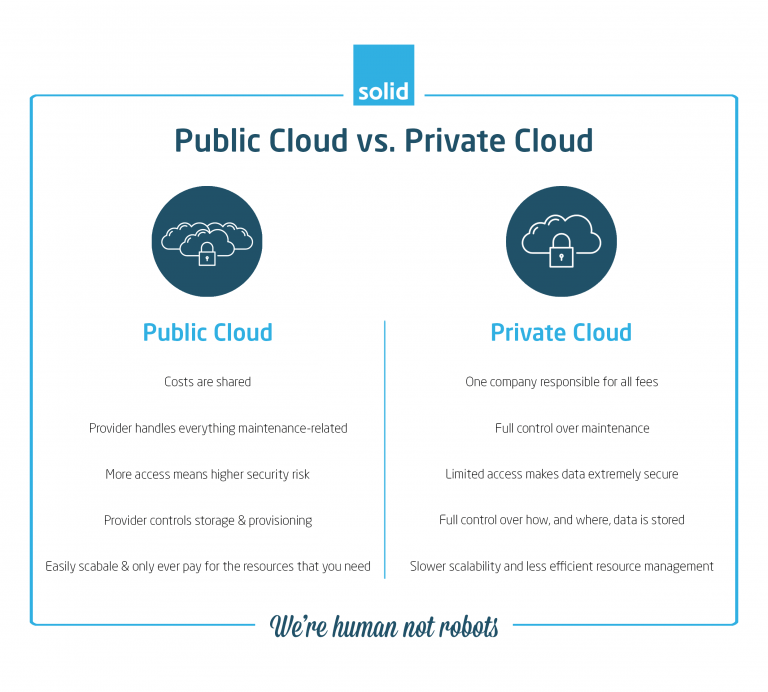
You’ve realised that, as a company, you need to move your storage and infrastructure to the cloud. The reliability, flexibility, scalability and security are clear advantages that you can simply no longer ignore. But what type of cloud solution should you use? You start asking yourself which is better: public cloud vs. private cloud.
When many businesses first start looking at cloud solutions, they look at the big picture. They think of the advantages of the platform itself. But once you’ve made the decision to switch to the cloud, there’s a new question to consider. Should you be using public cloud services, or private cloud services? Each offer their own advantages, and have their own drawbacks. In this article, we’re going to delve into the nitty gritty of public cloud vs. private cloud and see what sets the two platforms apart.

What is Public Cloud?
When most people think of cloud services, they think of Public Cloud solutions. They are the most common and readily available. They’re quick and easy to access. And, perhaps most importantly, they are low-cost. These factors make them some of the most popular options for businesses to use.
What makes these services ‘public’ is that the resources they use are shared between companies. A third party provider will have resources available to them within a data centre. They then ration these services out between the companies that hire them.
Say, for example, a third party provider has 100GB of disk space available to them within the data centre. (Most providers will have A LOT more than this, but it’s a good, round number to work with). Customer A needs 25GB of storage space, Customer B needs 30GB, and Customer C needs 40GB. The 100GB of disk space will be divided between them, leaving 5GB remaining for another customers’ needs.
The same approach is taken to the infrastructure that businesses require. Companies approach a third party provider, who will offer them services that meet their server, memory, and CPU needs. The provider will have enough of these resources to cover multiple companies, and will assign the relevant resources as a business requires them.
Benefits of Public Cloud
What makes Public Cloud a particularly popular solution in the public cloud vs private cloud debate? It’s more than just the lower price tag, though that is a clear benefit. Since resources are shared by multiple companies, the costs of running and maintaining the infrastructure is shared as well. It’s also extremely easy to upgrade or downgrade the package that you take out with your provider. You can ‘rent’ more or fewer resources as your needs fluctuate. Plus, the maintenance and management of the resources is taken care of in its entirety by your provider. You bear no responsibility for it whatsoever – a scenario that many businesses appreciate.
Limitations of Public Cloud
However, Public Cloud solutions aren’t right for every business. While sharing resources does reduce the costs associated with them, it can impact their availability. Let’s look again at that scenario mentioned earlier, where 100GB of storage is being shared between three companies. If one of them needed extra storage space beyond their provider’s existing capacity, it wouldn’t be available to them. The same may apply when extra processing power is required. Or when a company needs data to be stored in a specific area that their provider doesn’t have access to.
And while a third party managing all infrastructure and resources is convenient, it can be problematic. Particularly when you need your servers or memory to be configured in a certain way. You lose control over the way that your resources are provisioned. While many businesses don’t need this type of control, there are scenarios where it is essential for operations.
Finally, because public cloud services are shared between multiple companies, multiple people have access to them. The more access is provided, the bigger the risk to your data’s security. In an ideal world, only people you directly trust would have access to your infrastructure. And that’s where private cloud facilities come in.
Who needs an onsite server room? The cloud's got all the room you need!
What is Private Cloud?
Public Cloud is all about sharing resources to lower the costs involved in their maintenance and upkeep. Private Cloud is, as the name suggests, about one company gaining exclusive use of infrastructure. It can either be set up within an office environment, providing you with the best of both on-premises and cloud solutions, or it can be stored within a data centre. You can either manage the services internally, or can hire a third party provider to manage them for you.
Benefits of Private Cloud
In the argument of public cloud vs. private cloud, one of the big advantages on the Private side, as mentioned earlier, is that Private Cloud provides optimal security. This is because access to the infrastructure is far more restricted.
Private Cloud solutions also provide the best possible availability. Resources are not being shared between businesses and are always available for use as and when you may need them. There’s no risk of a third party overselling their resources. (A practice that Solid Systems avoids even when on their public cloud offerings!) The resources are entirely yours to do with as you like.
But the biggest benefit is in the control that using private cloud facilities provides. You can control who has access to your resources and how they are used. You can control provisioning and configuration. And you have full control over where your data is stored geographically, and in what way.
Limitations of Private Cloud
While maintaining full control over your resources is a huge benefit for some companies, it does, however, come at a premium. Private Cloud facilities are a lot more expensive, both from the capital outlay perspective, and from their maintenance and overheads. Plus, hiring a third party to manage your private cloud infrastructure will naturally be more costly than using their own public cloud facilities.
The other downside to Private Cloud services is that the management of resources is less efficient. Some projects that you run may require high levels of processing power, for example. Others may need a large amount of memory. When you are making use of public cloud facilities, you can upgrade and downgrade your capacities as you need them. But this is not the case with private cloud solutions. If you need high processing power for one task, you’ll need to invest in a large amount of CPU, even if it would be unnecessary for most of your operations. This difficulty in scalability is a big downfall.
Which is Best for Your Business?
Now that you know the difference between public and private cloud, you may be wondering which is right for your business. You may find that public cloud solutions are perfectly suited to your needs. You may find that the control that private cloud facilities offer is far more up your alley. There is no right answer when it comes to public cloud vs. private cloud. It will differ from company to company, and operation to operation.
This is why it’s important to chat to an IT company that has vast experience in cloud solutions when switching to a cloud platform. Finding the right company can be as easy as searching in a directory like 2FL.com, where you can compare your the cloud specialists available in your area. But you don’t need to look any further than Solid Systems.





